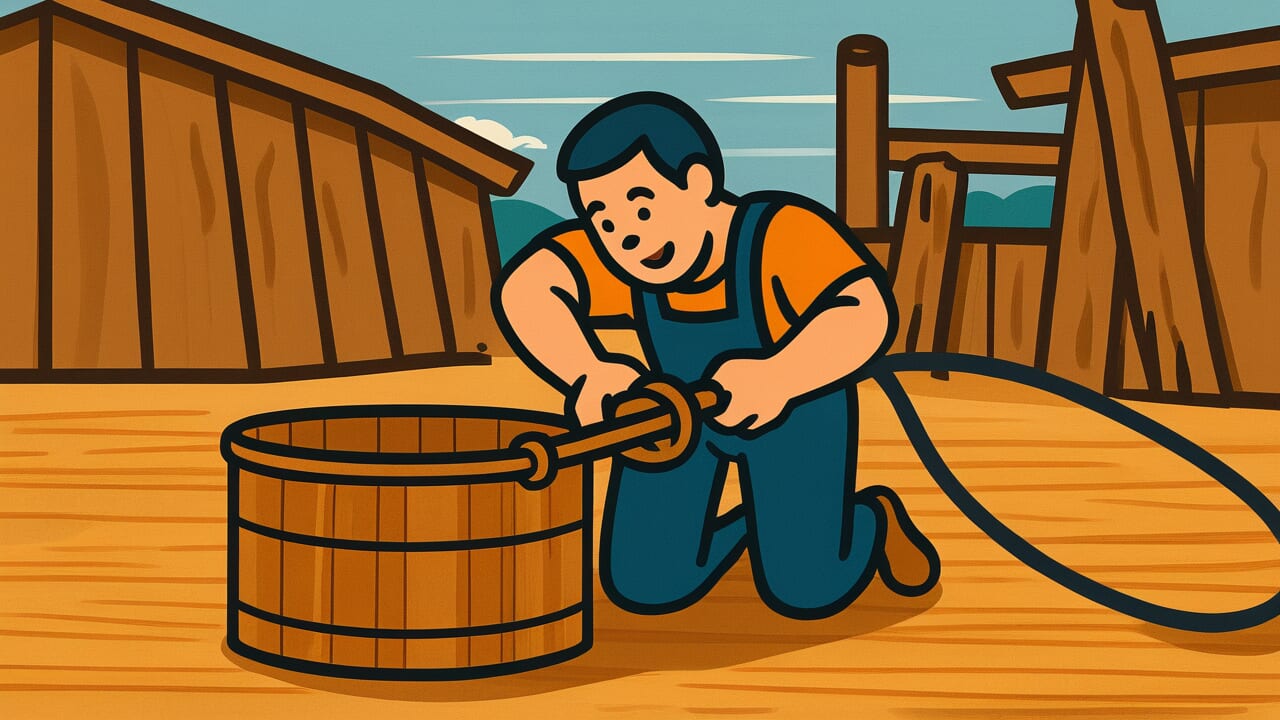How to Read “The well bucket rope cuts through the well frame”
Tsurube nawa igeta wo tatsu
Meaning of “The well bucket rope cuts through the well frame”
“The well bucket rope cuts through the well frame” means that even the smallest effort, when continued patiently without giving up, will eventually lead to great results.
The proverb uses the seemingly impossible image of a soft rope cutting through hard wooden well frame to express the powerful force of persistence.
Today’s efforts may seem small, but by accumulating them, they will someday lead to unimaginably great results.
This proverb is used when you feel discouraged by your own lack of power, or when your goal seems too far away and you want to give up.
People encourage themselves by saying, “Even if I’m weak now, remember that the well bucket rope cuts through the well frame.”
Even today, when we want to believe in the value of steady effort, these words give us courage.
Origin and Etymology
No clear written records remain about the origin of this proverb, but we can make interesting observations from its components.
“Tsurube” refers to the bucket used to draw water from a well. “Nawa” means the rope that suspends it.
“Igeta” is the wooden frame that surrounds the top of the well. This proverb uses everyday well equipment as its imagery.
Imagine the rope of the bucket moving up and down, rubbing against the edge of the well frame again and again each time water is drawn.
Nothing happens once or twice. But day after day, year after year of continuous use, the soft rope leaves marks on the hard wooden frame.
Eventually it carves deep grooves. Finally, it gains enough power to cut through the frame completely.
This phenomenon was likely something people before the Edo period actually witnessed. Wells were central to daily life, and replacing well ropes was routine work.
People knew from personal experience the surprising fact that soft, weak rope could defeat hard wood over time.
From this, a proverb explaining the greatness of persistent effort was likely born.
Usage Examples
- If you keep studying steadily every day, the well bucket rope cuts through the well frame, and results will surely come someday
- It’s a small shop, but we continued with the spirit of the well bucket rope cuts through the well frame, and now we’ve become indispensable to the community
Universal Wisdom
The reason “The well bucket rope cuts through the well frame” has been passed down through generations is because it touches both the fundamental anxiety and hope that humans possess.
We humans face many moments when we painfully realize how small our power is.
When confronting big goals or overwhelming difficulties, how tiny and powerless our single step seems.
At such times, a voice whispers in our hearts: “Does this effort have any meaning?” “Isn’t this impossible for me?”
But at the same time, humans have hope they cannot abandon. The expectation that today’s small step might connect to tomorrow and eventually become a great path.
This proverb gives solid foundation to that hope.
The fact that soft rope cuts through hard wood shows the possibility of weakness transforming into strength.
This isn’t magic. It’s realized through time and persistence, weapons that anyone can possess.
Our ancestors understood one of life’s most important truths. Great achievements don’t come from momentary talent, but from the accumulation of small daily efforts.
This universal truth is what keeps this proverb alive across the ages.
When AI Hears This
This phenomenon of the well frame breaking and the bucket falling is actually the very mechanism modern structural engineering calls “single point failure.”
What’s interesting is the magnitude of load that single point, the well frame, bears.
The weight of the bucket and water, the tension of the rope—all of these concentrate on the well frame as a fulcrum. In other words, the well frame is a “stress concentration point.”
The same principle works in bridge design. In the 2007 Minneapolis highway bridge collapse, the fracture of just one steel plate caused the entire bridge to collapse.
According to fracture mechanics research, materials have a limit called “fracture toughness value.”
The moment this is exceeded, cracks propagate at about half the speed of sound.
The moment the well frame breaks is the same—the wood fibers tear apart all at once, and that destructive energy transmits through the rope to the bucket.
What’s even more noteworthy is the “lack of redundancy.” Modern critical structures have backup support systems, but wells don’t have that.
Only the well frame supports the entire system. This is efficient but extremely fragile at the same time.
If one point breaks, the whole thing immediately stops functioning.
The reason aircraft have multiple engines is precisely to avoid this vulnerability.
People in the Edo period learned this “terror of critical points” from daily life without any mathematical formulas.
Lessons for Today
What this proverb teaches us modern people is the importance of having the courage not to rush results.
Modern society demands immediate effectiveness. Things that don’t show quick results tend to be seen as worthless.
But truly valuable changes, in most cases, progress slowly in invisible places.
What you learned today, the skills you trained today, the relationships you built today may not bloom tomorrow.
But they are never wasted.
What matters is having the determination to continue your efforts even when they seem small.
The well bucket rope doesn’t cut through the well frame in one day. It might take years. But the groove definitely deepens.
What is the “well frame” in your life? It might be a weakness you want to overcome, or a dream you want to achieve.
Even if someone laughs at today’s small step, you don’t need to worry.
Looking at soft rope, who could imagine it has the power to cut through a well frame? But it happens.
Your persistence will someday surely produce results beyond imagination.



Comments